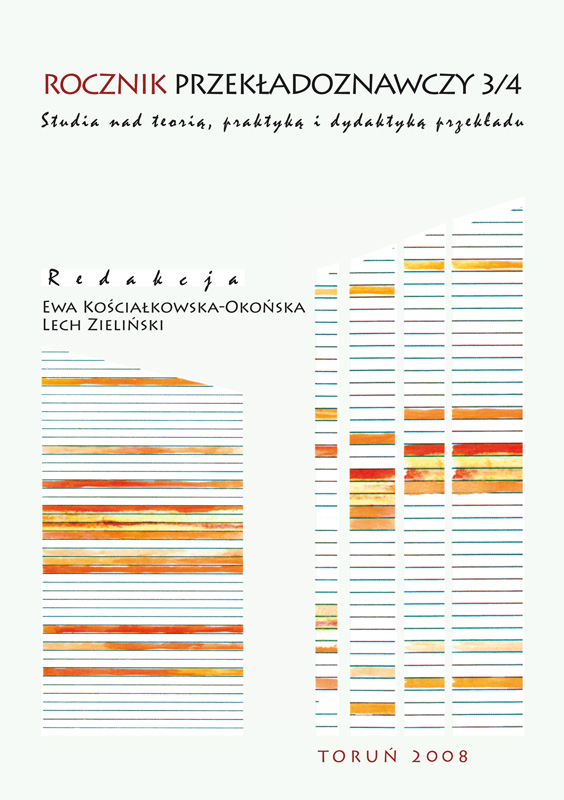English and German as pivot languages in Chinese-Polish and Polish-Chinese translation of contracts of lease
DOI:
https://doi.org/10.12775/RP.2008.004Keywords
pivot language, interlanguage, legal translationAbstract
This article gives short characteristics of the main problems of Chinese-Polish and Polish-Chinese translation of the different types of lease contracts. The translation was done by using pivot languages: German and English. The language and vocabulary used in Chinese, Polish, German and English lease contracts are researched into. Then, the translation strategy suggested by Kierzkowska (2002) is discussed. The author shows the problem of influence of culture on legal systems and languages of the law in general. Basic differences between property law in Poland, China, Germany, England and USA are analysed. Linguistic features and culture background that characterize legal language in China, Germany, Great Britain, USA and Poland differ significantly. Many rules and practices of foreign law can only be understood by applying legal thinking, cultural archetypes, history and common linguistics patterns of foreigners. The author also shows differences in the meaning of terms, which apparently signify the same entities and concepts in Polish and Chinese legal languages but, in fact, differ significantly. The author gives examples of other sources of ambiguity in translation of Polish and Chinese lease contracts and focuses on polysemy and homonymy which make the interpretation of legal language difficult and ambiguous. The meaning of Chinese characters depends on the textual context. However, when the translator does not know the background information of translated legal texts, it is very difficult to achieve high quality legal translation. Finally, the author shows that the translation of Chinese and Polish contracts by using German and English can be more difficult, problematic and incorrect due to differences between pivot languages, source language and target language.
References
Arntz, R., Picht, H., 1991, Einfuhrung in die Terminologiearbeit, Hildesheim. Burgerliches Gesetzbuch, 2006.
Gniewek, E., 2002, Podstawy prawa cywilnego i handlowego, tom I, Wrocław. Hanyu falu cidian, 1999, Beijing.
Jones, C. W., 1989, Basic Principles of Civil Law in China, New York.
Kierzkowska, D., 2002, Tłumaczenie prawnicze, Warszawa.
Koebler, G., 2002, Rechtschinesisch. Deutsch-chinesisches und chinesisch-deutsches Rechtsworterbuch fur jedermann, Munchen.
Li Mingzheng, „An Introduction to the Provisions on Financial Leasing Contracts in the Contract Law of China”, [w:] Comparative Analysis on the Chinese Contract Law, Gebhardt, I., Zhang Yuqing, Schroder, R. (red.), Berlin, s. 333–348.
Radwański, Z., 2002, Prawo cywilne – część ogólna, Warszawa.
Radwański, Z., 2005, Zobowiązania – część ogólna, Warszawa.
Rheinstein, M., 1987, Einfuhrung in die Rechtsvergleichung, Munchen.
Sandrini, P., 1996, Terminologiearbeit im Recht. Deskriptiver begriff sorientierter Ansatz vom Standpunkt des Ubersetzers, Vienna.
Sarcevic, S., 2000, New Approach to Legal Translation, The Hague.
Schroder, R., 2003, „Landlord and Tenant Law in the Federal Republic of Germany in Comparision to the Landlord and Tenant Law of the People’s Republic of China”, [w:] Comparative Analysis on the Chinese Contract Law, Gebhardt, I., Zhang Yuqing, Schroder, R. (red.), Berlin, s. 315–331.
Senger, H. von, 1994, Einfuhrung in das chinesische Recht, Munchen.
Stolze, R., 1999, Die Fachubersetzung, Tubingen.
Tokarczyk, R., 2005, Współczesne kultury prawne, Kraków.
Wegmann, K., 2005, Rechtsdenken. Schnittpunkte West und Ost. Recht in den gesellschaft s- und staatstragenden Institutionen Europas und Chinas, Munster.
Yinhan Falu Cidian, 1998, Beijing.
Zhonghua Renming Gongheguo Mingfa, 1999, Beijing.
Webografia
Matulewska, A., 2005, „Własność i zobowiązania w aspekcie translatorycznym
polsko-angielskim i angielsko-polskim”, [w:] Investigationes Linguisticae,
t. XII, s. 62–76.
http://www.staff .amu.edu.pl/~inveling/index.php?page=issues&vol=12&cat
=0&article=72.
http://www.handelsblatt.com/news/_pv/_p/200051/_t/ft/_b/1236012/default.aspx/index.html (dostęp: 08.03.2007).
http://www.ft d.de/politik/international/174314.html?nv=cd-topnews, (dostęp: 16.03.2007).
Downloads
Published
Issue
Section
Stats
Number of views and downloads: 775
Number of citations: 0



